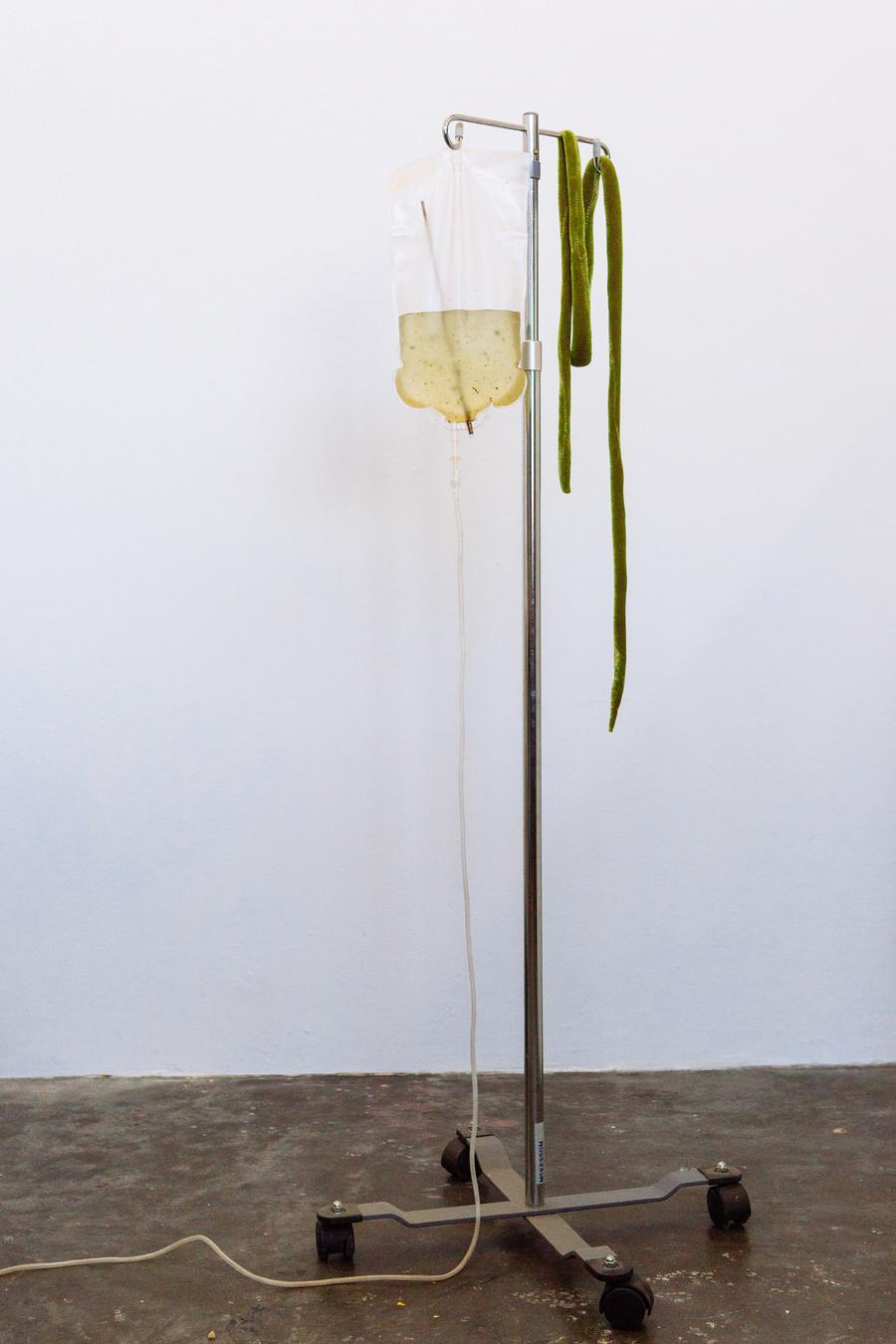Jillian
Crochet
http://www.jilliancrochet.com
It's ok.
2019, 3m looped, performance video. Image Description: A large green aloe plant covers the screen as fingers caress the serrated edges.
It's ok. (gloved)
April 2020, 3m looped, performance video. Image Description: A gloved hand caresses the leaves of a large aloe plant. The sky is overcast and city buildings can be seen in the background.
It's ok. (screen)
April 2020, 3m looped, performance video. Image Description: A bright green aloe plant is on a computer monitor, a pointer finger caresses the image of the leaves.

Primordial Preservation
2019
18" × 60" × 18"
Algae from down da bayou, copper tube, IV bag, IV stand, aerator, medical tubing, sand, silk velvet. Image description: A metal IV stand on wheels holds up a clear IV Bag of greenish liquid. Small green blobs float around inside. Clear tubing cascades down to the ground and trails to the left of the image. A green velvet vine-like sculpture hangs on the right side of the IV stand.
Primordial Preservation
2019, detail video, Courtesy of Jeff Enlow. Image description: Green algae blobs floats and whirls around in a clear IV bag. A dark green vine-like soft object hangs in the background.
Does this feel normal?
2018, 59s looped, performance video. Image Description: A smooth round rock is hit by a reflex hammer over and over. The reflex hammer has a shiny metal handle and an orange triangle head, and glints in the sun. The rock bounces around a table that is covered in a white cloth hospital gown with a diamond pattern.
A surreal sense of time and disembodiment shapes my performance and video work through repetition, haptics, and sound. Plants and natural objects become surrogates for my body, to explore complicated relationships and loss. The oscillation of the subject/object relationship reflects and unsettles our understanding of nature and self. What is natural/unnatural? What bodies are included/excluded — important?
I use soft science - my own unscientific methods of failure and absurdity - to unravel thoughts about epigenetics and evolution. Experimental containers in plastic and silicone are futile attempts to preserve blobs of algae, moss, rocks, and heirlooms. They become portals for time-travel, communication devices. Algae, my primordial ancestor, must know secrets buried in the swamp; hidden in its DNA is our shared epigenetic history. Maybe the gentle agitation of algae within an IV bag will caress extra-sensory understanding into consciousness. Amorphous blobs of algae are hard to grasp, much like the elusive quality of memory. Can I communicate with plant-life through touch?
Touch has been at the center of my making practice and research. Does touch allow for a more primal and complex mind-body connection than vision alone — fostering deeper understanding and empathy with the other? I am eager to delve into this during/post the social isolation of COVID-19. We were already starved for touch and connection in our contemporary digital landscape, but what does/will it mean to touch in an era of highly infectious and dangerous diseases? How can we explore touch in the digital realm? Can a viewer feel the haptic sensation of touch through a screen? How do we find comfort and care in the digital?
After months (or years) of isolation, we will need to relearn how to touch and socialize — without fear. What will we learn from disability practices, and can empathy be strengthened for disability communities in the wake of this pandemic?
Jillian Crochet is an artist from the Gulf Coast working in sculpture, video, and performance. Her sculptures use haptic and embodied aesthetics to challenge the hierarchy of the senses. Her practice questions the medical model, desire for control, and the complex ethics of genetics and experimentation. Familial artifacts, found objects, luscious textiles, medical supplies, and natural elements become haunting amorphous surrogates to explore disability and grief. The unceasing work of self-advocacy led her to explore performance art. Her practice seeks to liberate the disabled body from normalized marginalization and oppression. She earned her BFA from the University of Alabama in 2007 and is a MFA in Fine Arts candidate at California College of the Arts graduating in May 2020.